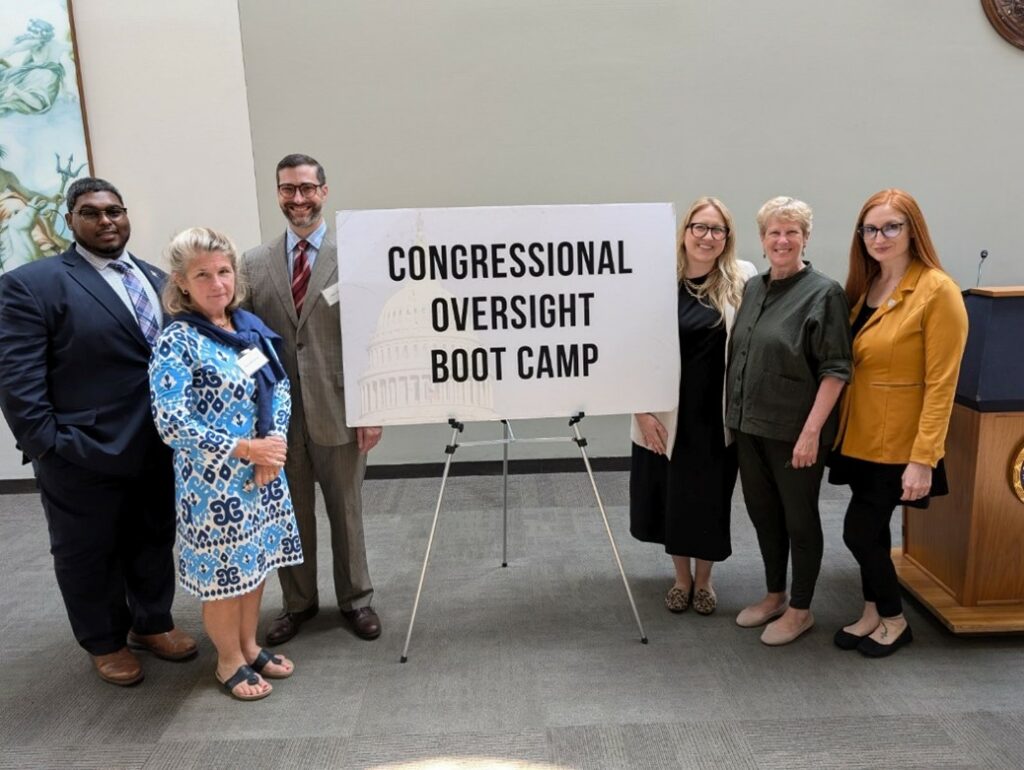
In August, the Levin Center’s D.C. team partnered with the Project on Government Oversight and the Lugar Center to host the 19th Oversight Boot Camp – a two-day, intensive training for congressional staff (from the House and Senate and both parties) on how to conduct fact-based, bipartisan, oversight investigations. We thought it was a good idea to visit our nation’s capital and see what we could learn from them and share with you!
We all know that Congress and the state legislatures are different in many ways. Congress is better funded and better staffed, for one. However, that doesn’t mean you can’t do important oversight work in your legislature. You just have to be a little more creative and resourceful! So, let’s look at a few of these differences and how to navigate them.

At the Boot Camp, a congressional staffer told me that a representative’s personal office only had ten staffers. That probably sounds like a dream, because there are almost no legislative offices in the states with that many staffers! The 105 members of the Alabama House of Representatives share ten direct staffers primarily handling scheduling and constituent services. Many legislators are not provided any personal staff or may have only one person running the entire office. Perhaps you and your small staff can’t take on a full oversight investigation by yourselves – but who says you have to? Ask other legislators to join your inquiry and bring their staffers aboard! Reach across the aisle – bipartisan investigations benefit from diverse perspectives and often produce findings that carry more weight than a partisan endeavor.
Members of Congress also work with communications teams, committee staff, and professional investigators. While those resources might not always be as available in most state legislatures, most standing committees have some professional and clerical staff assistance. If you can convince a committee chair that your oversight investigation is worthwhile, committee staff can assist you.
Regardless of available staffing, state lawmakers should look outside their own teams for resources that can greatly enhance their capacity to conduct effective oversight. State legislators and committees can often draw on the resources and expertise of oversight partners, such as state auditors general, inspectors general, legislative fiscal agencies and legislative counsel, as well as experts from universities, nonprofit organizations, and the business community. Effective oversight at the state level is often about building partnerships that enable you to gather and share important information.

Our veteran investigators in D.C. told us that, when they start an oversight investigation, they spend 1 – 3 months speaking to experts about the issue before taking any other action. Following that timeline, Florida, Georgia, Idaho, New Mexico, Oregon, and many other states would never make it to step two in a single session year! In a part-time legislature, you’ll need to use your time and staff strategically, perhaps assigning one staffer to interview experts while another compiles a list of documents you will need and witnesses you should interview, and another contacts your oversight partners to see if they have completed relevant investigations.
You can also use time between sessions, often referred to as the “interim,” to conduct or commission audits or studies of oversight topics with reports due by the time session resumes. This gives the legislature an opportunity to conduct more fact-finding or hearings on the information discovered during the interim. The Colorado Legislature makes extensive use of such interim commissions and studies, such as the Legislative Oversight Committee Concerning Colorado Jail Standards (which was also featured in a blog post last year!)
Investigative committees in Congress generally release the report of the investigation before holding a hearing. They use hearings to present information to the public – at Boot Camp, we learned never to ask a question in a hearing if you don’t already know the answer! This is the best practice, but in a state legislature with limited time, staff, and resources, it just may not be feasible. You might need to gather facts from witnesses at the hearing so that you can finish your investigation and report! That’s okay. Getting information to further your oversight investigation should be your top priority.
Every state legislature is unique – that’s why find them endlessly fascinating! We’re not suggesting that Congress doesn’t face challenges when investigating issues, but state legislatures certainly encounter additional obstacles because of shorter sessions, smaller staffs, and fewer resources. We’re here to help! We look to Senator Levin’s impressive oversight investigations as a template, take what will work in your state legislature, and leave the rest. As you look through our content and participate in our trainings, keep that in mind – one size does not fit all, but oversight must fit into your legislative plan. If you’re not sure how to do that, get in touch with us! We’d love to help.
